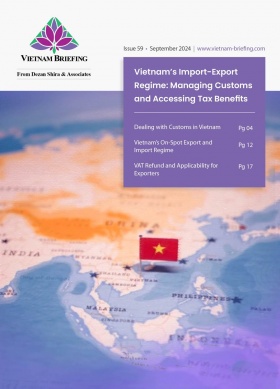Q&A: Understanding Vietnam’s Customs Guidelines on Special Cases in 2024
In 2024, Vietnam’s General Department of Customs (GDC) released multiple official letters guiding customs procedures during special events, including tax-free imported goods repurposing, system failures, and maintaining tax incentives after project ownership changes.
What are the customs procedures for repurposed tax-free imported goods?
Last July, GDC issued Official Letter 3701/TCHQ-TXNK (hereinafter, “Official Letter 3701”) regarding customs procedures for repurposing goods in Vietnam.
Under the 2014 Customs Law, the obligations of customs declarants include:
- Providing complete and accurate information for customs authorities to pre-determine the code, origin, and customs value of goods.
- Being responsible before the law for:
1) The authenticity of the declared content and submitted and presented documents; and
2) The consistency of information content between the records kept at the enterprise and the records kept at the customs authority. - Implementing decisions and requests of customs authorities in carrying out customs procedures, customs inspection, and supervision of goods and means of transport.
- Keeping customs records for goods that have been cleared for five years from the date of registration of the customs declaration, unless otherwise provided by law.
- Keeping accounting books, documents, and other documents related to exported and imported goods that have been cleared through customs within the time limit prescribed by law.
- Presenting related documents when requested by customs authorities for inspection.
How to submit a new customs declaration?
When repurposing tax-free imported goods, customs declarants must make a new customs declaration, following the procedures promulgated in Circular 38/2015/TT-BTC (amended by Circular 60/2019/TT-BTC) of the Ministry of Finance:
- The new customs declaration must clearly state the original customs declaration number.
- The new usage purpose must be stated in the “Notes” box of the electronic customs declaration or the “Other notes” box on the paper customs declaration.
- Enterprises do not have to provide the original declaration number when repurposing tax-free imported goods if the goods satisfy these requirements:
- Being exempted from import tax; and
- Subject to non-import tax that has exceeded the customs record retention period of five years, counted from the time of import to the time of repurposing.
How to declare customs value for repurposed tax-free imported goods?
According to the current regulations, the customs value of repurposed tax-free imported goods is determined based on the actual selling price. In cases where the customs authority has grounds to determine that the declared value is inappropriate, the customs value shall be determined according to regulations and consistent with the actual goods. Thus, the customs value is declared according to the actual selling price shown on the liquidation sale contract.
How can customs declarants proceed with customs procedures during a system failure?
Under Official Letter 3748/TCHQ-GSQL, GDC promulgates the procedures during a system failure for customs declarants.
For export goods, the customs declarants must:
- Print 02 copies of the export declaration/transport declaration under customs supervision that have been cleared/released/approved for transport.
- Submit them to the Supervision Department of the Customs Sub-Department managing the border gate, port, warehouse, or designated location.
For imported goods, the customs declarants must:
- Print and submit 02 copies of the import declaration/transport declaration under customs supervision that have been cleared/released/put into storage/approved for transport/brought to an inspection site outside the border gate to the supervision department of the Customs Sub-Department managing the border gate, port, warehouse, or designated location.
- Present goods subject to customs sealing, including goods under customs supervision during transportation, goods taken to inspection sites outside the border gate for customs sealing.
- Prepare a transfer record.
After the system is fixed, the competent customs branches shall immediately update the corresponding system with information on exported and imported goods.
How can investors maintain tax incentives after project ownership changes?
Official Letter No. 3747/TCHQ-TXNK, issued by the GDC, aims to enhance the management of duty-incentivized projects that experience ownership changes. It outlines the conditions and procedures for handling ownership transfers in investment-incentivized projects.
Accordingly, Decree No. 134/2016/ND-CP (as amended) stipulates that tax incentives can be maintained in the following scenarios:
- Transfer of investment incentive projects.
- Transfer of duty-exempt imported goods from one incentive project to another under the same owner.
- Situations not covered by the Law on Enterprises and the Law on Investment, such as:
- Transfer of imported goods used for fixed assets in new enterprise establishment or capital contributions.
- Separation, mergers, consolidation, and other forms of business conversion.
Both the previous and new project owners must submit the following documents to customs authorities:
- Proof of the change in project ownership.
- The previously registered list of duty-exempt goods and related customs declarations.
- Documents detailing the transfer of duty-exempt goods, including whether it is partial or full, transfer timelines, and agreements on rights and obligations.
- Signatures from both the original and new project owners.
The new project owner is required to:
- Properly use the tax-exempt goods associated with the project.
- Report the annual usage of these goods to the customs authority that maintains the Tax Exemption List.
About Us
Vietnam Briefing is published by Asia Briefing, a subsidiary of Dezan Shira & Associates. We produce material for foreign investors throughout Asia, including ASEAN, China, and India. For editorial matters, contact us here and for a complimentary subscription to our products, please click here. For assistance with investments into Vietnam, please contact us at vietnam@dezshira.com or visit us at www.dezshira.com.
Dezan Shira & Associates assists foreign investors throughout Asia from offices across the world, including in Hanoi, Ho Chi Minh City, and Da Nang. We also maintain offices or have alliance partners assisting foreign investors in China, Hong Kong SAR, Dubai (UAE), Indonesia, Singapore, Philippines, Malaysia, Thailand, Bangladesh, Italy, Germany, the United States, and Australia.
- Previous Article Managing Your Vietnam Business Recovery in the Aftermath of Typhoon Yagi
- Next Article Samsung’s US$1.8 Billion Investment to Boost Vietnam’s OLED Manufacturing Capacity































